
# 226
July 02, 2004
In this issue:
UNITED NATIONS DEVELOPMENT PROGRAMME (UNDP)
- Prevention of Conflicts: Press trip to the South of Kyrgyzstan
- Functional Analysis: Continued Support to the Public Administration Reform in the Kyrgyz Republic
- Religious Leaders Are Ready to Act Against AIDS
UNITED NATIONS CHILDREN’S FUND (UNICEF)
- “Tell in One Minute” – the Third Regional One Minute Video Workshop
UNITED NATIONS DEVELOPMENT PROGRAMME (UNDP)
Prevention of Conflicts: Press trip to the South of Kyrgyzstan
On June 24-28, a large group of Kyrgyz as well as international journalists (20 people) visited Osh and Batken provinces of the Kyrgyz Republic as well as trans-border areas with Tajikistan.
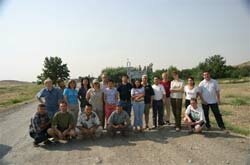 The goal of this press trip was to get acquainted with the work of UNDP program on conflict prevention in the south of Kyrgyzstan, visit the villages, where different projects aimed at brining people together and strengthening social harmony in the region are being implemented within the framework of the program. The goal of this press trip was to get acquainted with the work of UNDP program on conflict prevention in the south of Kyrgyzstan, visit the villages, where different projects aimed at brining people together and strengthening social harmony in the region are being implemented within the framework of the program.
The trip agenda included multiple meetings of the journalists with the program beneficiaries and partners – representatives of state administration, public sector and community based organizations. This let the representatives of the so called “fourth power” get the first hand information about general situation in the region and listen to the opinions of the impact of the program on preventive development on keeping peace and harmony in Ferghana Valley.
The five-day program also comprised a briefing organized for the UN Journalist Club members on the existing situation in the cross-border regions of the three southern provinces and the methods used by UNDP to promote social harmony in the southern parts of the Kyrgyz Republic, particularly – in the cross-border areas.
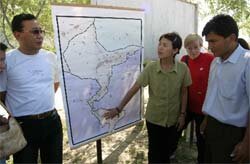 This region is one of the most vulnerable throughout the Central Asia. It is characterized with high population density, ethnic and cultural diversity, high level of poverty and scarcity of resources of cultivable land, water and finances. The situation is complicated by the complex border line, existence of the post-soviet enclaves, limited crossed-border trade and the difficulties related to crossing the borders by the population of the three countries. This region is one of the most vulnerable throughout the Central Asia. It is characterized with high population density, ethnic and cultural diversity, high level of poverty and scarcity of resources of cultivable land, water and finances. The situation is complicated by the complex border line, existence of the post-soviet enclaves, limited crossed-border trade and the difficulties related to crossing the borders by the population of the three countries.
“If the Central Asia is called the School of Diplomacy, then the Ferghana Valley could be called the University of Diplomacy”, said Abdiraim Jorokulov, Manager of the UNDP Preventive Development Program in the South of Kyrgyzstan, at the briefing. “We have to be particularly delicate, cautious and patient in the process of program implementation here. This is the only way to ensure its success”.
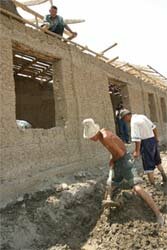 The journalists got detailed information and statistics about the system of early warning reports, about the work done by the program staff with the population of the target villages as well as of the principles of the program of cross-border cooperation being implemented in partnership with the UNDP Tajikistan office in the cross-border regions of the two countries. Particular attention has been paid to coordination of donor activities in the Ferghana Valley and to the role of the Preventive Development Forum and the Donor Council created due to the program initiative. The journalists got detailed information and statistics about the system of early warning reports, about the work done by the program staff with the population of the target villages as well as of the principles of the program of cross-border cooperation being implemented in partnership with the UNDP Tajikistan office in the cross-border regions of the two countries. Particular attention has been paid to coordination of donor activities in the Ferghana Valley and to the role of the Preventive Development Forum and the Donor Council created due to the program initiative.
For the next three days, the group of journalists visited number of pilot villages, where the UNDP Preventive Development Program helps the population as well as local administrations in conflict prevention through realization of various projects and events, teaching them the effective methods of conflict resolution among different groups of population and introducing the situation monitoring and early warning systems.
Among the sites visited by the journalists were the villages of Aravan region of Osh province: Esenbai and Akshar, the villages of Highland Dara zone in Batken province and the cross-border areas adjacent to Tajikistan, including the village of Ak-Sai.
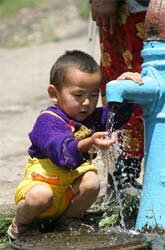 The mass media representatives saw with their own eyes how the situation related information is collected and analyzed in the most vulnerable regions, how the program staff help to strengthen partner relations between the population and local administration. The mass media representatives saw with their own eyes how the situation related information is collected and analyzed in the most vulnerable regions, how the program staff help to strengthen partner relations between the population and local administration.
In the village of Esenbai, which is fenced with barbwire from three sides, along with the absence of drinkable and irrigation water, the most important problem is education opportunities for children. Till recently, children used to go to school located in the territory of Uzbekistan. But after Uzbekistan fenced its territories with barbwire, the children were obliged to go to school located 7 km away in another village. This kept the parents concerned about the safety of their children and at the same time, caused the growth of social tension in the village. That is why the first project supported by the Preventive Development Program was School Construction.
“We have to think of children first of all”, said Makambay Abdykalykov, Esenbai Community Leader, at the meeting with the journalists. “So, none of the villagers ever doubted the necessity of school contraction. Whole village was involved in this work”.
“Our villager have always been friendly”, said Kalbay Ernazarov, Community Leader, at the opening ceremony of pipelines of drinkable and irrigation water in the village of Sari Taala in Highland Dara. “However, this program has brought us even closer together and now we are sure we can do a lot independently”.
Highland Dara villages were damaged due to soldier attacks in 1999 and the UNDP Program on preventive Development aimed at relieving the post-conflict social tension and helping people to regain peace and confidence in the future. Number of programs implemented in this remote and isolated villages of Batken province not only contributed to sufficient improvement of social infrastructure, but also taught the villagers to closely cooperate with the local administrations and other international organizations. Now, there are the World Bank program on Village Investments, the projects funded by the Asian Development Bank, USAID and GTZ being implemented in these villages.
“Now I know what real courage of Kyrgyz people stands for”, said one of the journalists after the trip to the Highland Dara villages. “These people not only refused to support the guerrillas and left their homes over one night taking only children and elderly with them, but they also came back to their villages after the crisis.”
The next day was the richest and the most important. As the journalists admitted, every day, it was getting more and more knowledgeable. The agenda of this day included a meeting of the Kyrgyz journalists with the Tajik colleagues in a Kyrgyz village of Ak-Sai, surrounded by Tajik land from three sides and a trip to enclave of Voruh, all surrounded by Kyrgyz territories.
One of the participants admitted the unique nature of this meeting. He emphasized that the most important is to see the problems existing in the cross-border regions and the ways of resolving these problems with your own eyes.
“The most important is that we – journalists should be closer to one another”, he said. “This will let us “build more stabile bridges” of good neighborhood in the Ferghana Valley and bring to people reliable information concerning the situation in the neighboring countries.
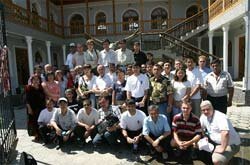 “It is so pleasant to see that such a large team came together to support the efforts of the two countries and UNDP in keeping harmony in this region” said in her speech referred to journalists Tokto Ilyazova, Deputy Governor of Batken province, who participated in the program of journalist visit for two days. “It is so pleasant to see that such a large team came together to support the efforts of the two countries and UNDP in keeping harmony in this region” said in her speech referred to journalists Tokto Ilyazova, Deputy Governor of Batken province, who participated in the program of journalist visit for two days.
The borderline in the Ferghana Valley is so complex that it was hard to identify the borders of which states the cars are crossing at the given moment. Therefore, the cross-border project implemented by the UNDP offices in Tajikistan and Kyrgyzstan aims at brining together the two nations, which have historically had brother relations. It also aims at reestablishment of the disturbed relations between the communities, revival of the cross-border trade and creation of the atmosphere of good neighborhood and harmony.
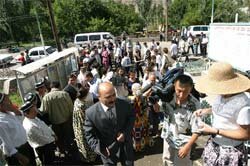 Elimination of the risk factors was exactly what the UNDP project on Rehabilitation of the Pumping Station in the village of Ak-Sai aimed at. This pumping station ensures proper irrigation of Ak-Sai fields and apricot gardens. The villagers still remember the Soviet-time conflicts for water with the neighboring Tajik villages. Elimination of the risk factors was exactly what the UNDP project on Rehabilitation of the Pumping Station in the village of Ak-Sai aimed at. This pumping station ensures proper irrigation of Ak-Sai fields and apricot gardens. The villagers still remember the Soviet-time conflicts for water with the neighboring Tajik villages.
“We are safe now”, said Talay Ibraimov, Head of Ak-Sai Municipality, at the meeting with the joint journalist group. “The fields are irrigated; people look into the future with confidence and are no longer angry with the neighbors”.
Contribution to social harmony, exchange of information and planning of joint activities are the goals of the Resource Centers being established due to common efforts of the UNDP offices in Tajikistan and Kyrgyzstan in the villages of Tozhikon (Tajikistan) and Ak-Sai (Kyrgyzstan).
“Now we know what it feels like to live at the border”, admitted one of the Kyrgyz journalists after the trip. “In Bishkek, civilization achievements are perceived as ordinary things and we don’t even think of how precious an achievement is the drinkable water. But what struck us most of all is that sometimes people live in incredibly tough conditions and still they remain openhearted, kind and hospitable.”
For additional information, please contact Olga Grebennikova, UNDP Public Relations Officer. Tel.: (0 996 312) 61-12-13. Fax: (0 996 312) 61-12-17. Email:
You are welcome to visit UNDP website at http://www.undp.kg/ where you can find a detailed information on UNDP programme activities in Kyrgyzstan.
Functional Analysis: Continued Support to the Public Administration Reform in the Kyrgyz Republic
A Joint Project implemented by UNDP and the UK's Department for International Development (DFID) has completed the functional analysis of the territorial branches and subordinate organizations of the Kyrgyz Ministries of Health and Education.
In 2002, a similar analysis was held at the central offices of these ministries. This complex and significant work, carried out by UNDP and ministries' experts, resulted in the Resource Agreement between the Ministries of Education and Finance, prepared in cooperation between UNDP and USAID and approved by the Kyrgyz Cabinet on 3 September 2002.
This Agreement enabled the Ministry of Education to broaden the rights of the Ministry in making its own structure optimal, making decisions on personnel, using the budget resources and paying bonuses to its employees for an efficient job.
On 28 June 2004, the Cabinet meeting deliberated on the implementation of the Resource Agreement. It was noted that this mechanism ensured implementing recommendations proposed by the persons behind the functional analysis. These recommendations made the central organization of the Ministry of Education focus on priority tasks and functions, leave out duplicating and irrelevant functions, reduce staff and strengthen the role of the Ministry in managing subordinate organisations.
Thus, the new Statute of the Education Ministry has 7 tasks versus 11, and 20 functions versus 58. Some functions were eliminated as obsolete and not relevant in the free market economy, while some of them were merged and focused in the key divisions of the Ministry. The structure of the Ministry was also modified, and all norms on the ceiling of the staff force for a central ministry were respected. It was for the first time that the Ministry's staff was not aligned by a sectorial principle, but by a functional standards, which enabled the agency to focus on policy making and improvement of quality of education in the country.
Besides, some elements of programme budgeting have been introduced into the practice of the Ministry, many procedures of funds movement have been simplified, and the employees received more incentives to efficiently work and respond to emerging financial issues. This resulted in an almost double raise of the staffers' salaries.
Given the benefits of the Resource Agreement for the Ministry, as well as some legal constraints, the Cabinet decided to extend the Agreement to 1 January 2006 and to spread out this practice in other government agencies.
On 29 June 2004, the UNDP and DFID experts started the functional analysis of local governments and the pilot rural municipalities in Issyk Kul province.
For more information, please contact Mr. Alexander Kashkarev, UNDP Programme Officer. Phone in the office: 61-12-13, email: Mobile: 58-90-79
Religious Leaders Are Ready to Act Against AIDS
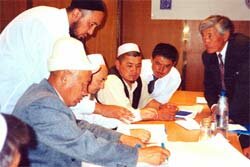 On 16th of June State Commission on Religious Affairs and Spiritual Management of Muslims, National AIDS Center, “Ranar” NGO with assistance of UNDP HIV/AIDS Programme took one more step forward to bring along religious leaders of the country. On 16th of June State Commission on Religious Affairs and Spiritual Management of Muslims, National AIDS Center, “Ranar” NGO with assistance of UNDP HIV/AIDS Programme took one more step forward to bring along religious leaders of the country.
At the Issyk-Kul lake more than 40 religious leaders of Issyk-kul and Naryn regions gathered to receive knowledge on HIV/AIDS and discuss the ways they can contribute to Kyrgyz prevention programme in frames of the seminar “Social mobilization of the state bodies and assistance of religious leaders in realization of state programme on HIV/AIDS prevention”. Similar seminars were already held in the southern region of Kyrgyzstan.
Throughout the Issyk-Kul seminar religious leaders were given comprehensive information on HIV/AIDS worldwide and in Kyrgyzstan and on experience and problems of prevention of HIV/AIDS.
Dilmurat Aji Orozov, representative of Spiritual Management of Muslims of Jalal-Adad region, urged his colleagues: “If we don’t participate in healthy life style, awareness promotion, then there will be no one to help people in our communities. We understand our responsibility and in the scale of our community should put all efforts to explain to people about responsible behavior towards our health”.
Religious leaders play important role in prevention of HIV/AIDS and formation of the positive attitude towards healthy lifestyle, because religious leaders enjoy great authority among the population, especially in rural area.
“We should concentrate on family values of people. We saw data that states that parents give way to little information to their children, we will urge parents to raise this problem and be open to their kids. Let different organizations do their own activities, we will go ahead and do what we can do best” said one the imams of Issyk-Kul region, he said.
Series of seminars designed for religious leaders is about to be completed one more seminar for religious leaders of Chui and Talas provinces will be conducted by State Commission on Religious Affairs in close partnership with UNDP HIV/AIDS Programme.
For more information, please contact Ms. Mia Rimby, UNDP Programme Officer, Ms. Ekaterina Paniklova, UNDP HIV/AIDS Programme in the Kyrgyz Republic Manager, or Ashir Chikeev Information/Communication Specialist, tel.: (996 312) 62-04-49, tel/fax: (996 312) 66 36 91, e-mail:
UNITED NATIONS CHILDREN’S FUND (UNICEF)
“Tell in One Minute” – the Third Regional One Minute Video Workshop
On July 5, 2004 in the Issyk-Kul Hotel in Bishkek, the Third Regional One Minute Video Workshop for young people begins.
It is organized by the Regional Young People’s Media Network with support of the UN Children’s Fund (UNICEF), European Cultural Foundation (ECF) and the One Minute Foundation.
24 young people at the age of 12-20 from CIS countries will work in groups with technical help of trainers from Holland. Following the previous workshops that took part in Budapest and Tbilisi in 2003, the Bishkek’ Regional Workshop aims is to develop skills on production of minute video and strengthen young people’s participation in the life of the society. The topical theme of the Workshop is HIV/AIDS related issues.
All over the region there is a steep rise of HIV/AIDS cases. The solution requires a change in knowledge, attitudes and practices mainly among young people. Their active position and willingness to change are the main force and the key to solve the problem. “Opinions and viewpoints of children and young people always bring fresh light to any issue and convey most powerful messages to their peers. We hope that this workshop will give the participants the opportunity to learn, exchange ideas, innovate and imagine new ways to increase the share of their contribution to tackling the problems their fellows are confronted to”, believes Smaranda Popa, UNICEF Programme Coordinator in the Kyrgyz Republic.
The four day workshop will gather a diverse mix of people: among them is a 13-year old boy working in a market to sustain his family who dreams of becoming a teacher; a boy with disabilities who is very active in youth/health advocacy.
Young people who won’t participate in the workshop are also invited to produce their stories and submit them to the OneMinutesJr. Award 2004 (http://www.theoneminutesjr.org/) and the Kyrgyz International Day of Children’s Broadcasting Contest – 2004.
For more information, please contact Ms. Galina Solodunova, UNICEF Communications Officer. Tel.: (996 312) 611 211(ex.139); 611 224. Email:
|

